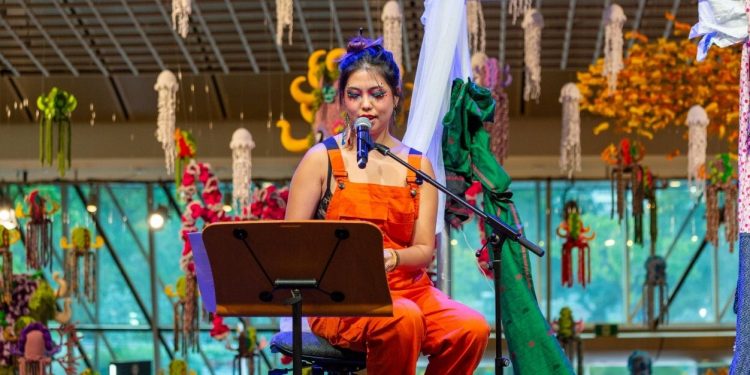A simple play with her sister was one of Marylyn Tan’s earliest forays into creative writing at just eight years old.
“It was called ‘Back With A Bird Bird’. I would storyboard it with little sketches – it was about this person who lost his penis,” she laughs. “I was proud of it because I thought it was so funny. I showed it to my mom, and she was like, ‘Why you write this kind of thing?’”
Despite this, the young writer gradually found herself developing a keen interest in creative writing, due in part to her love for reading: “It was always instinctual for me, because what comes in must go out. When you read a lot, you tend to want to write a lot as well.” She also credits her father for nurturing her love for the written word, as he would challenge her to create her own poems.
Meeting fellow poetry enthusiasts in secondary school further stoked her passion. She applied for the Creative Arts Programme, a creative writing seminar organised by the Ministry of Education and Yale-NUS College, when she was 15, but was not accepted into the programme. The rejection dealt a blow to the budding writer.
“[It was the] first taste of [being] commended by the institution for writing well, [having] a good grasp of literature, institutional encouragement or recognition getting built into you at that age. But I didn’t make it,” she recalls. “I was just thinking, am I a bad poet?”
Disheartened, she threw herself into exploring visual arts, avoiding writing in a bid to cope with the rejection.
“I got it into my head that maybe my writing is not as good as I thought it was… I got a bit snobby about [pursuing visual arts], [saying] writing is for people who can’t draw. But I think it was also an attempt to mask that rejection or disappointment.”
Ms Tan eventually joined the Creative Arts Programme at 17, during her first year of junior college. But things came to a halt when she was expelled after a video clip of herself and a schoolmate was circulated. “I was filmed doing an intimate act, and it went viral… The school authorities got wind of it. They didn’t know who to punish. So they kicked us out… It was a huge thing for somebody who had hitherto been a very good student, [and] never really got into any trouble.”
She chose to pursue psychology at a local polytechnic, and later graduated with a degree in linguistics from Nanyang Technological University. Her passion for the arts inspired her to spearhead arts collective dis/content in 2020. In August last year (2020), she made history as the first woman to win the English poetry category of the Singapore Literature Prize for her debut collection Gaze Back, which centres around the themes of femininity, queerness, and the occult.
TheHomeGround Asia sat down with Ms Tan to find out more about her creative process, her fascination with the occult, and what inspires her work as a writer and artist.
(NOTE: This interview has been edited for length and clarity.)
Marylyn Tan: Reading was a big part of the way my mum bonded with me. As early as I can remember, [it] one of the ways in which I got recreation and pleasure. My mother and I shared storytime. To this day, I feel like it’s really important for parents to read to their kids, because giving them a reading habit is one of the biggest leg ups they can give them in life.
TheHomeGround Asia: Tell us more about your school experiences – we understand that you were expelled at 17.
MT: My native queerness had barely begun to be developed. I hadn’t thought about [my identity as a queer person] very clearly until then. So it was all these things at once: are you going to be a failure? Are you a degenerate? Is your future ruined?
That really shaped the way that I started thinking about productivity and legitimacy. My parents kept telling me that [it was my] last chance to ‘make it’, whatever ‘it’ is. I think that was kind of like a gun to my head. I held that with me, [the belief that] I need to prove myself, otherwise I’ll never get to university. I did very well in poly[technic] when I got my diploma, and I did very well when I went to university. I graduated [as] valedictorian.
THG: How would you say that these experiences have shaped the kind of themes that you explore as a creative, both as an artist and as a writer?
MT: I’ve always been interested in the body. But being kicked out [of school] was definitely an influence – I always try to subvert norms of respectability and existing power. And I try to push the envelope when it comes to what is conventional [and] desirable, in any kind, form, medium of artistic convention.
I found it easier to do with writing [than] most things because you don’t really need formal training to be a poet. People do go to school for poetry, but I haven’t. And I don’t think I can. The way poetry is taught in most institutions, is not the way that I want to write poetry. Because a lot of the time people forget that the purpose of literature is to speak truth to power, and to destabilise the status quo. If you don’t do that, then what is the point of your writing? To further cement something that people already used to oppress other people?
Going through that experience [of being expelled] did give me this outsider perspective. I think that is because I was kind of forced to go into hiding for so many years – when you get kicked out of school [and become] a national scandal, you lay low for a few years – for my personality, that created [a] sort of resentment. When you write from a place of resentment, it tends to come out very angry, very brash, very like, ‘Yeah, let’s see how much you can take’. That was useful.
Because I am willing to talk about some of these things in relation to queerness, embodiment, to the way that we interact with each other, with the state, and directly with systems of power, it says the ugly thing, and it brings the ugly thing into the light. That’s what I find most rewarding. Because the work is doing something important that someone else hasn’t articulated before.
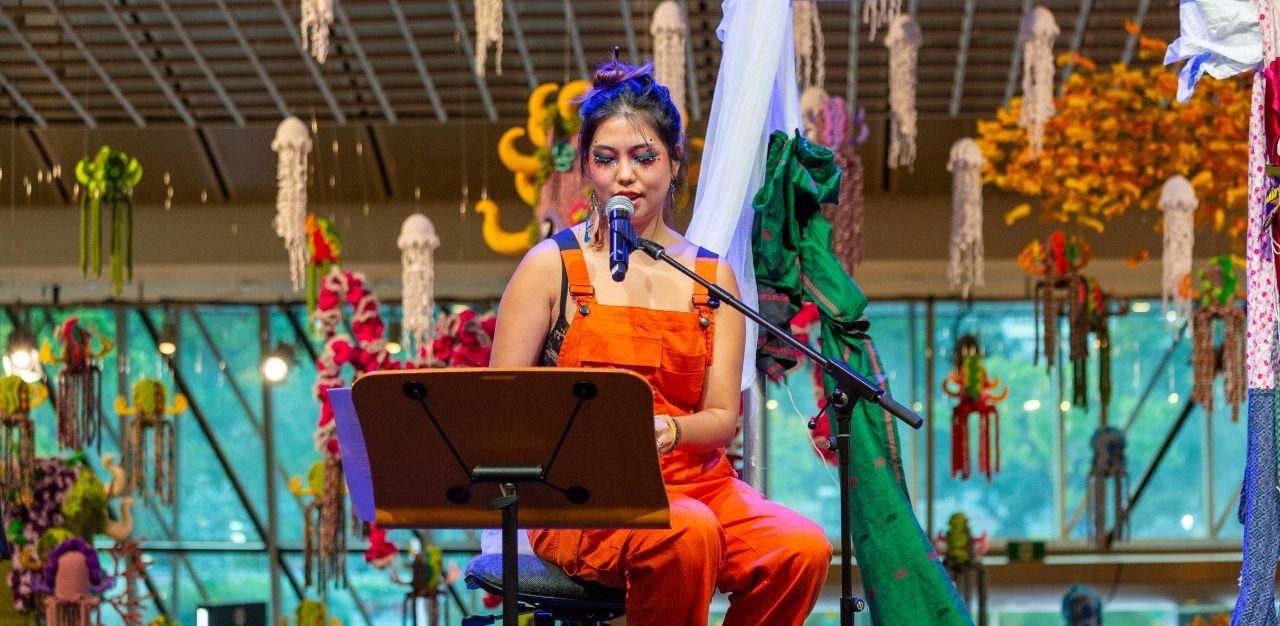
THG: Could you share more about your creative process? Do you always embark on a new project with the intention of making or projecting a statement through your work?
MT: I think the best art poses difficult questions to the audience that destabilises their worldview without being pedantic about it. That’s my purpose: both to speak things from my very specific truth, and to translate that into a sort of awakening or self connection in someone else. Because art is nothing without connection. I think that dynamic tension between going through something familiar, and then sort of bringing them to a place that hasn’t been considered before is something rare and extremely transformative.
My mentor Divya Victor always says you don’t really embark on a project, but sort of undergo [it]. As you’re writing or creating, you are yourself transformed by the process.
That’s the same approach I try to take with everything, because I do a lot of multidisciplinary work. Art installations, performances, or, most recently, a cabaret show. All these things have that in common: you are never the same person you [were] when you first started. I think it’s folly to say, ‘Oh, I’m going to have this exact product at the end of it’, because that’s not an art piece, that’s a creative brief. I tend to write about or make art about whatever is most immediate, most urgent to me at the moment.
THG: What was your reaction when you found out that you were the first female to win the Singapore Literature Prize for English poetry?
MT: I was completely shocked because I was so sure that I wasn’t going to win. People from the publishing industry [were] telling me [that] gay male authors [were] a shoo-in for it. So I was very bored. I told my parents not to watch it because nothing [was] going to happen; I’d never win anything in my entire life. It’s okay, I’ll get drunk and have a good time.
Then they told me that I won. My housemates were yelling; I was like, “please, please be quiet”. I had to do my acceptance speech drunk, and I was thinking, I need to represent the gays, the lesbians. It was quite lovely. Everyone was really nice about it. Even [author] Grace Chia, who had said [in 2014] that the SLP being given to yet another male poet, Joshua Ip, and not the multiple female poets who were in the running that year, was a manifestation of male privilege and sexism (a post which has since been deleted and the opinion rescinded). She said that it would be a disservice [to me and past writers] to say ‘it’s about time a woman won this prize’, so she would just congratulate me personally and left it at that. I thought that was sweet of her, such a beautiful gesture, because I didn’t know her; I always thought of her as one of Singapore’s feminist poets [and] authors [who] have been trying to push the envelope.
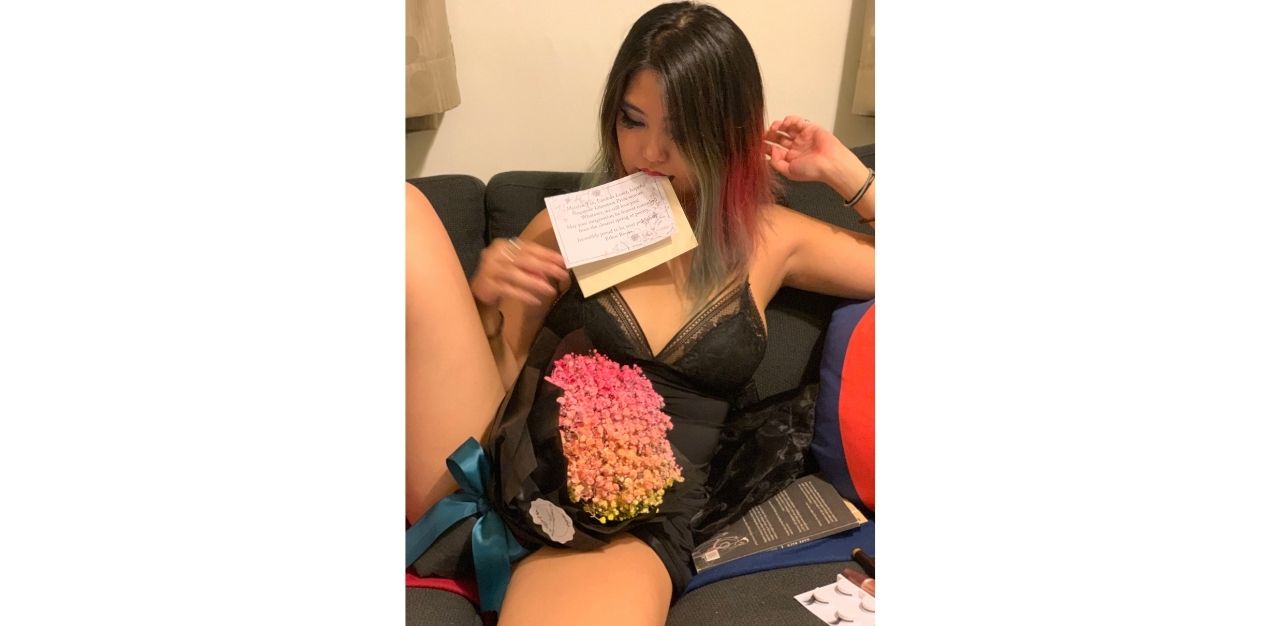
THG: I understand that femininity, queerness and the occult are some of the central themes that you explored in your debut collection, Gaze Back. Did you have an interest in these topics prior to embarking on the collection?
MT: I wrote [Gaze Back] from a place of a) I’m probably never gonna have the chance to do this again, and b) I am very angry about the way women, queer people and policed bodies are treated in the world. That was the very discontent idea behind Gaze Back. It was always something that I was interested in, before Gaze Back was written; I’ve always been a hoe for the supernatural, horror, magic, witchcraft. I wanted to build a bridge between the mundane, the profane, and the sublime. And I found witchcraft back in 2016 to 2017. When I was writing Gaze Back, it was really heating up: crystals, meditation, tarot. That coincided with climate change and the election of Trump. All of these things coalesced into the zeitgeist of using witchcraft to change the reality that you found so abhorrent, so distressingly disempowering.
Because I had been interested in witchcraft from when I myself [had been] disempowered as a teenage girl, that translated to ‘Oh shit, this is my moment’. This was the time to write the horrible witchy book that I had wanted to read, but couldn’t because it didn’t exist yet.
I was brought up in Catholic tradition and also Chinese culture. You have two very, very old cultures at play here. So I think for me, it was just a matter of time. I saw the opportunity, I took it. I said [to myself], this is the chance to write the book that you’ve always wanted to write, and always wanted to read. That was most important.
THG: What draws you to the supernatural and the occult?
MT: Isn’t everyone a little bit interested in the supernatural? If you ask someone [to share] something that [they] can’t explain, they usually have a really weird story to tell you. I think that it was just one of those things I latched on to in my childhood, and never stopped being interested in. The appeal of good horror, not bad, cheap, jumpscare horror, [lies in its] attempts to lay bare all of your anxieties and not really resolve them in the way [with a] happy ending like literature will do. It bears witness to what you are afraid of, what you’re fearing. And I think that there’s something very powerful in looking directly at the thing that you’re most afraid of, in the eye.
Queerness and horror are best friends. A lot of villains are queer-coded as well. So there’s always a relationship, in the dark, the deviant, the feral. All of these things come together, and you learn to live in that space. Which is, I think, also how I derive pleasure.
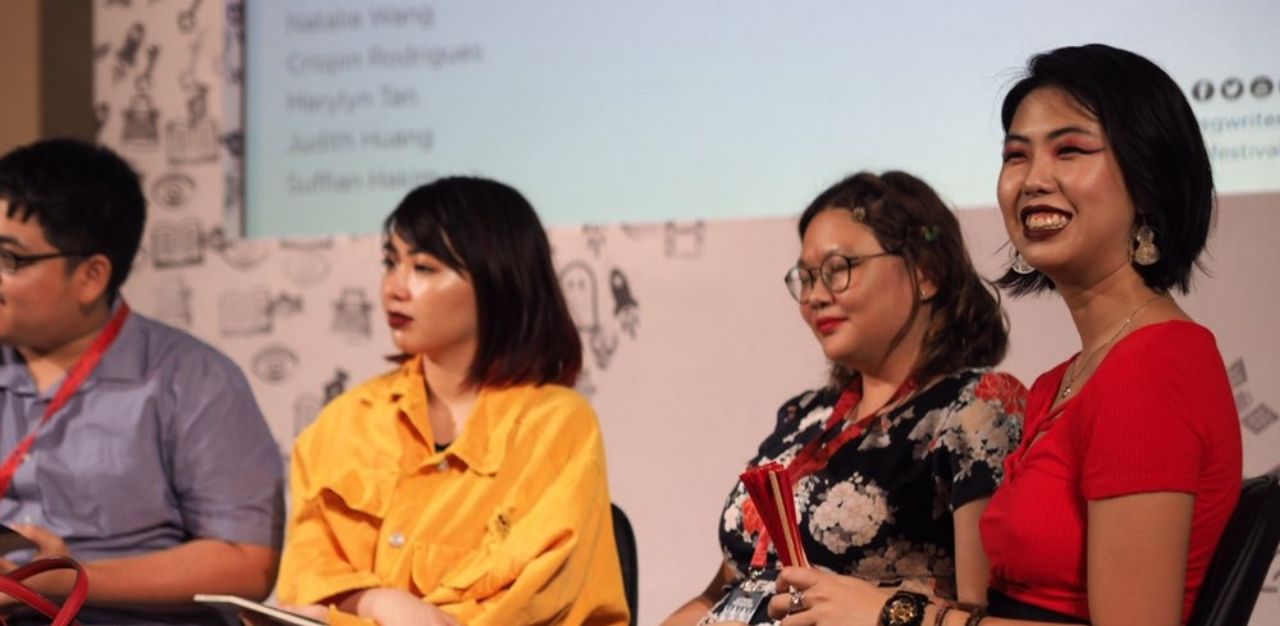
THG: What were some of the biggest challenges that you have faced in your creative journey so far?
MT: I’m not very good at following through. I like to start things, don’t put in the effort, or get burnt out and find myself not being able to put in the effort that I want to. That’s a problem. But I was [also always] making art to run away from being depressed. So it would follow that I am making art to wear myself out and not be depressed; that will come from a place of [being] really close to burnout.
Bad mental health has been a huge barrier to creation. Along with that, I have time management issues – how much energy do I put into a creative project, into living? The act of self-care, or the illusion of [it] is that when people on the internet say it’s okay to be anxious, depressed, stay in bed, take a mental health day, fine. But if I were to take a mental health year and don’t get better? Do I just stay there in that sick, wallowing state and feel worse at the end of it?
I read this thing online, [about] why [people] hate [themselves]. One of the things was not creating anything. It kind of stuck with me. As long as I can make something nice, I can write a poem, it’s fine. At least it means that whatever is happening internally is finding an expression. Even if it’s shit, or if what you’re creating is of no interest to anybody, it is of interest to you. Art is not just about productivity in the eyes of other people. It’s also about therapy.
THG: Tell us more about dis/content. What inspired you to begin this collective?
MT: dis/content purports to be a multidisciplinary collective, where members can cross pollinate each other and create work in the spirit of play.
[It] was born out of the pandemic. I was reading [that people were] upset about how they weren’t able to find a community or create artistically. It wasn’t [a case of] “I can’t create” but more like a mental block. I was getting frustrated with that [and] thought, I do want to create [a] community.
So I sent out an open call, got a few of my friends to be my production team, people I trusted. We’re on hiatus now, but seeing my friends put in work and go the distance for a project that we didn’t even know would take off the ground was really heartening.

THG: How has being an artist and writer changed you as a person?
MT: One of the things that I hold very dearly or strongly to myself as a core belief is that I am a person who wants to make ‘unibrow’ art; art that transcends both worlds. So if you want to hear something literary from me, great, but you’re also going to hear a lot of [profanities] like ‘f*** you, c******, k*****’ from me, because that is the aesthetic that we’re going for. And if you want it to be lowbrow and trashy, great, but you’re also going to get a lot of theory behind that.
It’s also made me care less about what people think of me, because when you fantasise [about] an audience, or when you think about who is going to understand or accept your work, there is this implication that if people don’t like it, I must be doing something wrong. When I was writing gigs, it was more, ‘For sure people are not going to like it, definitely.’ You start to fantasise an audience that looks like yourself: queer, feminist, witty, vulgar. Once you know that these are my people, the people that I write for, it becomes a lot clearer as to why you’re doing this.
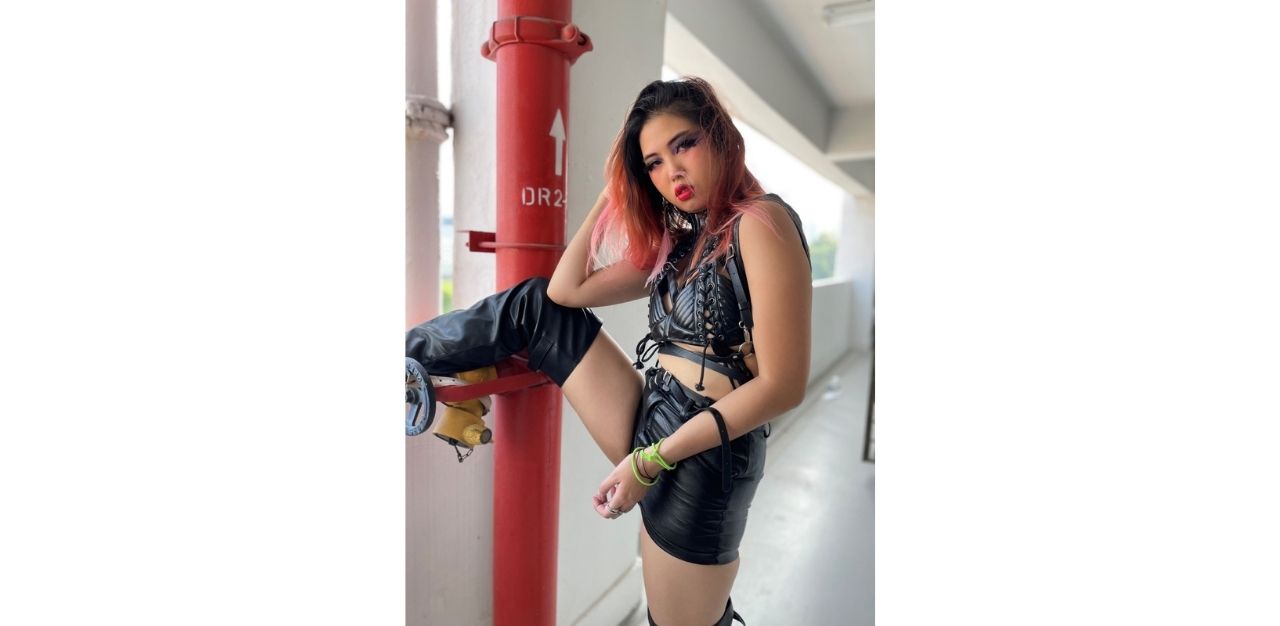
THG: Is straddling the line between creating for yourself and for others a constant conflict that you face?
MT: Yeah. More and more [now]. When [I was] just starting out, I had it easier in that sense because nobody’s ever seen my art before. No one has perceived it, given me feedback on it. At this point so many people have given me feedback on my art [that] I find it very difficult to extract who I am, what I believe, from what other people tell me that I should believe. Where it blurs the line between something that’s desirable for me and for you, especially with the same politics, sometimes I lose sight of the goal, which is to shock myself first before I shock anybody else.
THG: What keeps you going in your creative endeavours?
MT: Spite and arousal. I generally make things from a place of “F*** you” or “I want to f*** you”. And obviously politics, inequality, and anger, which is also kind of spite. Spite the system. Spite inequalities. And pleasure: I guess arousal can be subsumed under pleasure. The duality of man.
Join the conversations on TheHomeGround Asia’s Facebook and Instagram, and get the latest updates via Telegram.



